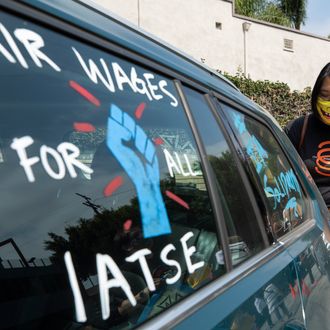
The International Alliance of Theatrical Stage Employees reached a tentative deal for a three-year agreement with the Alliance of Motion Picture and Television Producers. AMPTP represents studios like Disney, Universal, and Paramount, and if a contract deal had not been reached by Monday, 60,000 IATSE members would have gone on strike. Broad strokes of the deal were shared by IATSE in a series of bullet points, including ten-hour “turnaround” times between shifts, increased meal penalties, and a “living wage” for the lowest-paid workers on set. And although that strike was averted, many IATSE members are still not happy. “Basically nothing has changed,” Los Angeles-based DP Ernesto Lomeli told Variety. “I have not heard a single person saying they will vote yes.”
The actual final language of the contract is being written up now, and a ratification vote is still weeks off. On social media, many IATSE members have been expressing dismay at what few gains were won after such a display of collective willpower. According to IATSE, 90 percent of their members voted in the strike authorization, with 98 percent voting “Yes.” The Instagram account ia_stories temporarily shut off comments as members expressed dissatisfaction with the deal. The account initially called the comment shut-off an “accident,” but later in its Stories said it was done in a “moment of panic.”
Update, October 20: IATSE has released a timetable for ratifying both the Basic Agreement (BA) and Area Standard Agreement (ASA). The BA covers IATSE workers in the 13 West Coast Studio locals, and the ASA covers 26 locals outside of Los Angeles. After the language of both agreements is fully hammered out, IATSE members will vote on them simultaneously, in much the same way they voted to authorize the strike.
Update, October 27: On October 26, the union announced it tentatively reached a deal in its Area Standards Agreement, which covers 20,000 workers in areas outside of New York and Los Angeles. Per Variety, the deal, which also must be ratified by IATSE members, saw low-wage members get a boost of up to 60 percent in hourly minimum wages, a minimum of a 9 percent scale wage increase by the end of the three-year contract, and changes to rest periods. Specifics will be shared in a memorandum to members within the next few weeks. Members covered under this deal also voted earlier in October to authorize a strike amid stalled contract negotiations. Ratification for both the Basic Agreement and the Area Standards Agreement will occur online simultaneously.


